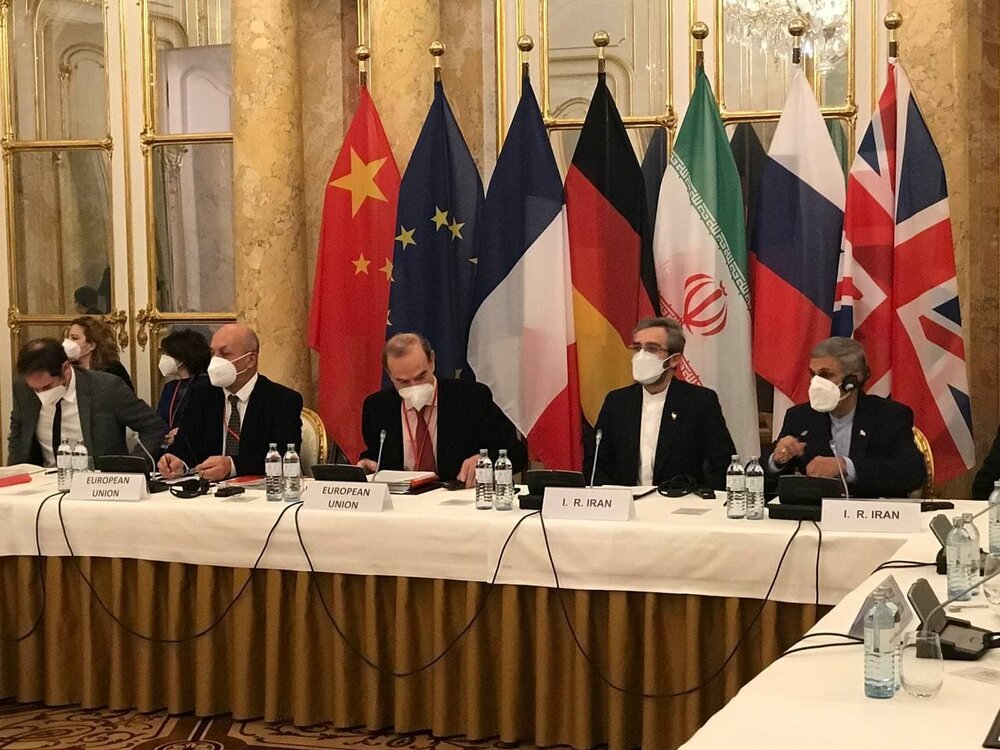Iran holds firm as West ratchets up media warfare

TEHRAN – Negotiators from Iran and the P4+1 group of countries have returned to Vienna after a short break for further consultations in capitals. During the hiatus, the West mounted a media warfare aimed at pocketing further concessions Iran is unwilling to give.
The seventh round of talks was resumed on Thursday with a plenary session of chief negotiators. The meeting in the Coburg Hotel was co-chaired by Deputy Secretary General of the EU External Action Service Enrique Mora and top negotiator of the Islamic Republic of Iran Ali Bagheri Kani, and with the presence of delegations of Iran, the P4+1 group (China, Russia, France, Britain and Germany), and the European Union.
The meeting came amid a tense atmosphere emanating from Western opposition to two Iranian proposals regarding nuclear- and sanctions-ed measures that should be taken by Iran and the other sides if a deal is reached at the current talks.
The proposals were met with a unanimous Western rejection under the pretext that they contain maximalist demands and unrealistic views. European and American diplomats launched a concerted effort to portray last week’s talks as unsuccessful and blame the alleged failure of the talks on Iran, a move that Iran decried as a blame game.
In the meantime, Iran underlined that its proposals were in strict conformity with the terms of the 2015 Iran nuclear deal, formally called the Joint Comprehensive Plan of Action (JCPOA). Also, Iran did not rule out that its proposals have been drawn on what has been achieved during the past six rounds, indicating a kind of continuity between the seventh and previous six rounds.
However, Iran made it clear that the outcome of the six rounds is mere drafts subject to negotiations. Pointing to this fact, Bagheri Kani has reiterated that nothing is agreed until everything is agreed.
It was in this atmosphere that the Vienna talks resumed on Thursday. Whereas Iran underlined the need for the West to avoid media warfare going into the talks, Western sources resorted to media psych ops immediately after the talks resumed.
The first European allegation was made hours after Iranian negotiators met their counterparts in Vienna on Thursday. While Iran emphasized its negotiating position of basing the talks on its proposals, a European source claimed that Iran agreed to pick up where the talks left off in June, something that Iranian sources debunked soon.
A European source, speaking on condition of anonymity, appeared to suggest that Iran had agreed to continue talks from where they left off in June and added this would be put to the test in the next couple of days, but made no mention of Iran's new proposals, Reuters reported.
But a source close to the Iranian negotiating team in Vienna rebuffed the Reuters report, saying that proposals made by Iranian negotiators last week's talks are still on the table.
“The proposals and views presented by the Iranian delegation in last week's talks are still on the table, and the Iranian negotiators will proceed based on these views during their talks,” the source told Tasnim.
“There has been no revision of Iran’s position and the proposed drafts have not been withdrawn. The other side should agree to discuss Iran's demands in detail,” the source added.
In addition to unfounded European allegations about the Iranian negotiating position, the U.S. also did its part in fostering an atmosphere of uncertainty in Vienna. American officials called into question Iran’s seriousness, casting doubts on the possibility to bring the Vienna talks to a swift conclusion.
This is while Iran has openly called for a swift and good deal. “We are all in Vienna to negotiate to reach a good agreement,” Iranian Foreign Minister Hossein Amir Abdollahian wrote on Instagram as the Iranian negotiators arrived in the Austrian capital.
“The Western parties should know that in the last eight years, enough has been said and they made promises that were never fulfilled, but today is the time to act and we are working to reach a serious and good agreement,” he said, adding, “Although we are doubtful whether the West is basically ready to lift the sanctions or only seeks to resolve its concerns in a one-sided manner, if the West takes part in the negotiations ahead with good intentions, initiative and constructive ideas, we will certainly see quick progress in the negotiations.”
Over the past week, Iran has been outlining the requirements and broad contours of a deal in Vienna. One such requirement is the need for the U.S. to lift all the sanctions imposed with the purpose of dismantling the JCPOA. Trump officials have, directly or indirectly, pointed out the purpose of U.S. sanctions on Iran was to prevent any future government from reviving the deal. They changed the logic of sanctions from nuclear-related authorities to those related to counterterrorism in a bid to create a wall of sanctions. The Biden administration has insinuated that it will stick to sanctions imposed under counterterrorism authority, thus committing itself to the so-called maximum pressure policy against Iran while pretending to seriously seek a revival of the JCPOA.
That is by no means acceptable to the Iranian negotiators. Because, judging from statements by former U.S. officials, all U.S. sanctions are related to the JCPOA and thus the U.S. should lift them as they are primarily intended to scupper the nuclear deal.
Differences over the lifting of sanctions have been used by the West as ammunition to cast a shadow of doubt over the talks. Western media sought to portray the talks as failing due to alleged Iranian intransigence. But this was refuted by Iran too. Disagreements over certain issues are an integral part of any negotiation. There would have been no negotiations without disagreements.
